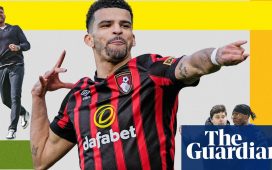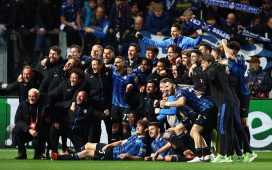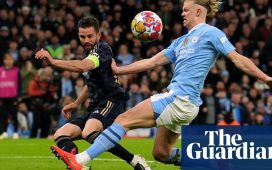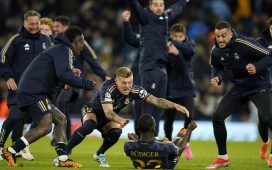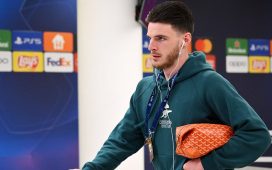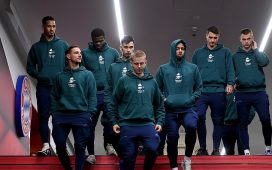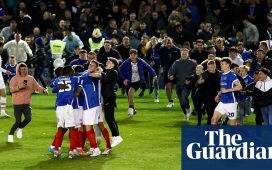If you have visited Barcelona, you’ll have passed through L’Hospitalet, the home town of Adama Traore.
You probably won’t have stopped to visit the mass of housing estates, built in the Sixties to relocate people from low-quality housing by the old docks, as well as the Roma community, and then swelled by immigration from South America and Africa.
It is a city next to a city, part of the urban sprawl of municipal districts but with its own identity, a modern multicultural Catalan conurbation and the gateway to Barcelona.

Adama Traore’s astronomic rise began on the outskirts of the Nou Camp in L’Hospitalet

The Wolves star lived in the shadow of the Barcelona stadium and could hear games played
On one boundary the city’s premier football club play, on the other is the airport, where tourists start their journey to the more recognised sites of Sagrada Familia and Las Ramblas in the city of Gaudi, Picasso and Messi. But from La Florida, the most densely populated barrio of L’Hospitalet, you can hear the roar of the Nou Camp.
Traore still remembers when he was seven, tucked up in bed at 1am a few hundred yards from the stadium, hearing the crowd celebrating the extraordinary debut goal scored by Ronaldinho for Barca, when he picked up the ball in his own half, beat two men and unleashed a stunning strike from 35 yards.
For the son of migrants from Mali who had made the journey to Europe and settled, like many others, in La Florida de l’Hospitalet, it was a roar that inspired a child.
‘For me Ronaldinho coming to Barcelona was amazing, something magical,’ says Traore. ‘Then Andres Iniesta and soon after, all these players came. But the one who started everything was Ronaldinho. At my age, Ronaldinho was the best.’

Traore idolised Barcelona star Ronaldinho and used to watch him play in training at La Masia

The Spaniard did not get a real chance at breaking through at Barca and moved on to England
For complicated internal political reasons, Ronaldinho’s debut in 2003 started at five minutes past midnight, concluding just before 2am. Even for Catalan night habits it’s a little late.
Hence, the seven-year-old Traore was in bed, though not asleep it seems. ‘I will always remember his first goal against Sevilla,’ he recalls. ‘He controlled the ball on the halfway line and went past two players. My house was not far from the Camp Nou, so I heard the shouting and the noise in my bed.
‘The game was at midnight and they were giving people free food to watch it. The stadium was full. And I watched it the next day. [Before Ronaldinho] Barcelona couldn’t challenge Real Madrid, because they had the Galacticos and they won everything. Then he came in.’
Soon Traore would actually have a close-up view of his hero. Spotted by Barca youth scouts, he would train at La Masia, the 18th century farmhouse which at that time was a boarding house for young players. Across the road, the first team used to train and back then, you could watch them through a wire fence.
‘We used to have free passes to watch the games and we used to see him in training next to La Masia,’ says Traore. ‘It was amazing and magical.’
Traore was also making a name for himself, albeit in a more local context. Small-sided street football abounded and among those vying to be the best, the five-a-side team with the Traore brothers, Moha and Adama, was the one to beat.

The 24-year-old moved to Aston Villa as a youngster but failed to make the impact he hoped for

Traore showed glimpses of potential at Boro under Tony Pulis before joining Wolves
‘When I was little, me, my brother and friends used to play a tournament against everyone, five against five. People used to know us, because I played in Barcelona and my brother played at Espanyol. We were winning most of our games and they were saying, “Oh, we know where there are two brothers, one playing at Barcelona, one at Espanyol. They have a friends’ team and they’re really good’’, so people came from all over [the city] and used to challenge us.
‘I was 14 or 15 years old at that time and used to play against 17s and 18s. We played everyone where we grew up and it was very funny.’
While L’Hospitalet is a ‘good place’, insists Traore, inevitably it has its fair share of issues that blight most densely populated estates. He witnessed knife fights and saw guns brandished, but on the makeshift football pitches, a different code prevailed.
‘There were some gangs [but] whenever we played against them, we focused on the football,’ he says. ‘That was good as well. You could play against a gang guy and whatever was going on in his personal life, he would forget that … all that would matter would be football.’
And Traore’s eyes were on a bigger prize.

The Spaniard has thrived under the watchful eye of Wolves coach Nuno Espirito Santo
‘Mentality is very important,’ he says. ‘Your parents can educate you, and that is important, but it is also about what you want from life. If you have things clear and you want your dream and you think you can get it, it [means] the whole world.
‘My dream was to be a footballer and I worked for it and this was what mattered, so what was [going on] all around, I didn’t care.’
Traore is often described as the fastest man in the Premier League, and some friends tried to persuade him to go to the track and be a sprinter. NFL scouts attempted to take him to America, but he resisted. ‘I wanted to be a footballer,’ says Traore. ‘My dream was always to play football.’

Traore has a unique physique combined with his pace, but says he is much more than speed
He had his moments at the Nou Camp, but only two of them, coming on for Neymar in a 4-0 win over Granada in La Liga and for Cesc Fabregas in a 2-1 win over Ajax in the Champions League.
But after making the grade, he was sold to Aston Villa, and so began his curious journey through English football. He didn’t make much of an impression at Villa Park but at Middlesbrough, under Garry Monk and Tony Pulis, he thrived in the Championship and was signed by Wolves when they arrived in the Premier League in August 2018.
Under Nuno Espirito Santo, he has matured into one of the most explosive players in the top flight and last month, after some false starts due to the pandemic and despite overtures from Mali, he made his full debut for Spain, substitute appearances against Portugal and Switzerland earning him rave reviews in his country of birth, though his first start in Ukraine ended in a shock defeat.
At 24, he has experienced a multiplicity of cultures. He speaks Catalan, Spanish, French, English and Bambara — a Malian language. Being at Wolves, he understands Portuguese yet so integrated is he to English life, that he is now an advocate of Sunday roast dinners, though as a Muslim he does not eat pork.
‘I love them,’ he says. ‘If you take out the pork I have everything!’
Roast potatoes, Yorkshire puddings, gravy?
‘I can’t eat them all every time but I do like the Sunday dinners, mixed with some sauce.
‘Catalunya is part of Spain so I have everything: Spanish, Mali, I have everything in me. And that is a good thing for me and I’ve been a long time in England now so I know the habits of England: cup of tea, Sunday dinner, that’s good. I like to know different cultures, adapt, know how they think. I take things [from everywhere] because it’s a beautiful thing to share, beautiful for me to have different cultures.’
His blistering speed will invariably come up in conversation and he worked with Olympic relay gold medallist Darren Campbell at Boro. Traore is also aware of the debate initiated by Raheem Sterling, that commentators focus too much on the speed and power of black players without recognising their other qualities.
‘I don’t think it [speed] is [to do] with colour,’ he says. ‘I think if you talk about Adama or Sterling, the first thing you think about is the speed.
‘For me, it doesn’t matter because I know what I have, I know how I play, I know what I give and if people think my ability only is the speed, OK — no problem.

Traore earned his first cap for Spain this month and won huge plaudits in his home country
‘Because after, in the game, I can do other things, so it will be a surprise. It doesn’t bother me, I know what I have and also what I’m working for.’
When he first arrived at Wolves he found his speed hampered by foul play, defenders grappling with him to slow him down, pulling at his shoulders and arms. The club doctor was the one who came up with an ingenious solution: pre-match, there is now the familiar sight of staff rubbing baby oil into his arms.
‘The staff here had a very clever idea because they knew I was having problems with my shoulder,’ he says. ‘Opponents were grabbing my arm for me not to move, pulling my shoulder. If you put on the oil, it’s impossible for them to grab me, especially if I’m moving as well.
‘In the first game it was very funny because many players grabbed my arm and they couldn’t catch me. They were asking, “What happened?” and I kept saying I didn’t know!
‘Everyone knows now but it doesn’t matter. It’s important for me because players have to use another tactic. Now I have the oil on my arm, I can slip [away]!’
At Wolves, he is likely to sign a new contract soon. Yet, when he is back in L’Hospitalet, friends always urge him to return to the club of his youth. Perhaps there is a sense at Barcelona that he is one of those elusive young players who slipped through their clutches too.
